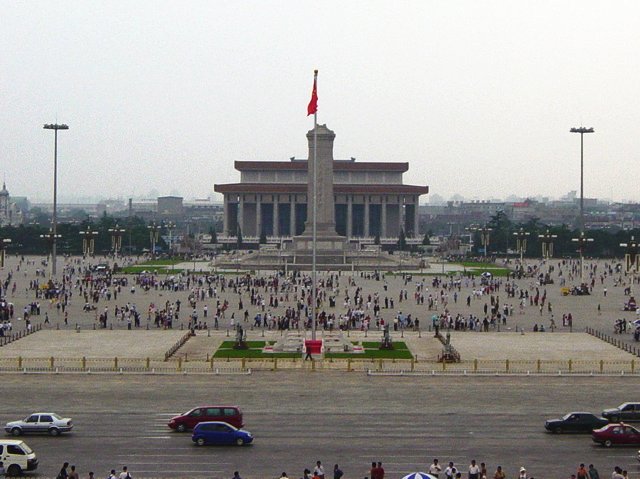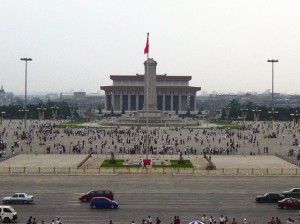
What can the U.S. learn from Putin’s trip to China?
 Vladmir Putin’s recent visit to China has included an array of agenda items ranging from energy to greater security cooperation in Asia. Russia has indicated that it plans to develop a stronger military role in the Pacific through joint-military exercises with the Chinese military, and both nations have also indicated their commitment to unity on the conflict in Syria.
Vladmir Putin’s recent visit to China has included an array of agenda items ranging from energy to greater security cooperation in Asia. Russia has indicated that it plans to develop a stronger military role in the Pacific through joint-military exercises with the Chinese military, and both nations have also indicated their commitment to unity on the conflict in Syria.
Military exercises and cooperation on Syria, however, were only a small component of President Putin’s trip to Beijing. Energy has also proven to be another vital area where both nations seek greater cooperation. Putin agreed to discuss greater energy cooperation with China and the Shanghai Cooperation Organization. The organization’s member states have an abundance of oil and natural gas resources and are the geographic link for Russian oil pipelines to China.
The continued development of a strong strategic partnership between Russia and China is not surprising. China’s growing economy will require access to energy resources, and it will undoubtedly seek Russia as a long-term important partner to continue its diversification of oil imports. China may also be hoping for a new ally in the Pacific as it seeks to modernize its military capabilities and challenge U.S. military power in the Pacific.
Russia clearly seeks a greater geopolitical ally and economic partner, and Putin has already called for an increase in bilateral trade from $70bn to $100bn by 2020. In terms of security, Russia has a historical legacy of sensitivity to foreign intervention in the near abroad and can be confident that China will not pose any security challenges due to its non-interventionist tradition in foreign policy.
The Russian-Chinese summit could not have had better timing. The summit comes on the heels of Leon Panetta’s announcement to increase the U.S. Naval presence in the Pacific to 60% of the U.S. Naval fleet. The move has raised eyebrows for those in the Chinese government who have viewed the U.S. pivot towards Asia as a challenge to their supremacy in the region.
Recently, Russia has also been annoyed with the United States. Hillary Clinton’s visit to Georgia drew criticism from Moscow and has further strained U.S. relations with Russia.
Despite their differences, China and Russia appear to have another area of common ground: they are concerned with long term U.S. strategy.
What does this mean for the United States?
There are a couple of key lessons that the United States can take away from the effort to strengthen Sino-Russian relations.
The first lesson is that both the U.S. pivot to Asia will create consequences. The agreement on joint-military exercises with Russia indicates China’s desire for a security partner in the Pacific, and U.S. involvement on sensitive issues such as Taiwan and the South China Sea will likely create long term ripple effects on Sino-American relations. The U.S. should approach these sensitive issues with great caution, and also with the understanding that pivoting to Asia too rapidly may cause greater mistrust between both countries.
Leon Panetta has already taken note, and has sought to assure China that the U.S. does not want to provoke a confrontation. Panetta’s call for a code of conduct in the South China Sea is a step in the right direction, and encouraging regional cooperation on Pacific matters through the inclusion of China will be a genuine reassurance to Chinese leadership. As of now, however, the Beijing meeting may indicate a larger strategic shift in Chinese foreign policy towards greater cooperation with Russia.
The next lesson the U.S. should take away regards the Russian “reset”. It is clear that Moscow has found a common ground with global leader in China. Both nations have a great deal of agreement on issues including terrorism, separatism, regional security, and trade.
On the other hand, Washington and Moscow have not seen eye to eye on a variety of security matters, particularly in Eastern Europe and Central Asia. Providing reassurances to Moscow and redefining the posture of NATO will be one of the most important long term steps in improving relations with Russia. Due to Russia’s sensitivity to Eastern Europe, the U.S. may have to decide if enhanced Russian cooperation in the Middle East will triumph the implementation of missile defense system.
Finally, the U.S. must recognize the importance of Russia and China in confronting security challenges in the Middle East. China, as one of the the largest importers of Iranian oil, will play a critical role in encouraging Iran to engage to productive dialogue with Europe and the United States over its nuclear program. Russia will also be significant actor in Iranian negotiations, and also maintains a great deal of leverage in Syria as a vital military supplier for the Assad regime.
Both Russia and China have the potential to be valuable assets in the Middle East and in global security issues with greater cooperation from the United States. The path towards this cooperation will be through reassurances and caution with U.S. military power in the Pacific and Eastern Europe. While the results remain to be seen, the meeting indicates that Russia and China are at least making steps towards greater cooperation and are seeking the benefits of a strategic partnership. The United States should join.
For more information on the implications of the strategic partnership between Russia and China, read this post by ASP’s Ashley Boyle.





